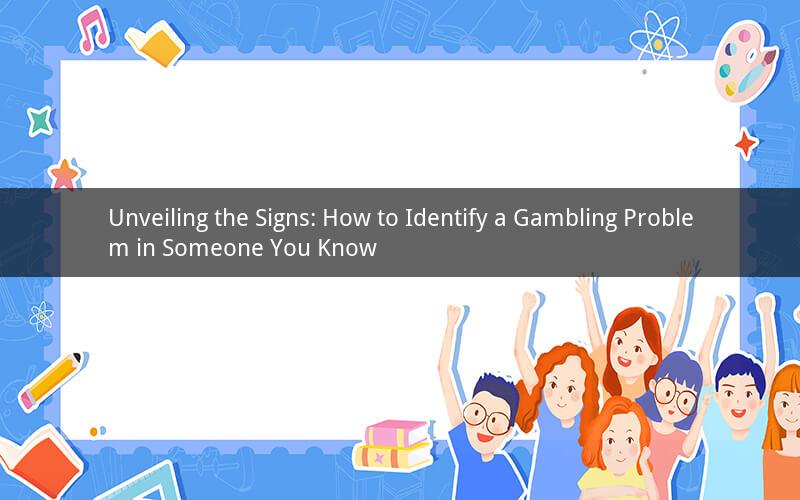
Introduction:
Gambling has become an integral part of modern society, providing entertainment and excitement to millions. However, for some individuals, it can spiral out of control, leading to a gambling problem. Identifying the signs of a gambling problem is crucial in order to help the affected person seek support and overcome their addiction. In this article, we will explore the various indicators that someone may have a gambling problem, providing insights into how to recognize and address this issue effectively.
1. Unusual Changes in Behavior:
One of the most prominent signs of a gambling problem is a noticeable change in behavior. Here are a few examples:
a. Sudden financial difficulties: If someone starts experiencing unexpected financial troubles, such as missing payments, accumulating debt, or borrowing money, it could be a red flag.
b. Changes in sleep patterns: Insomnia, excessive sleep, or a complete lack of sleep can be indicative of stress or anxiety caused by gambling.
c. Social withdrawal: A person with a gambling problem may start isolating themselves from friends and family, losing interest in activities they once enjoyed.
d. Increased secrecy: If someone becomes secretive about their activities, especially regarding money or time spent, it could be a sign of a hidden gambling problem.
2. Emotional and Psychological Symptoms:
Gambling addiction can have significant emotional and psychological effects on an individual. Here are some indicators to look out for:
a. Mood swings: Sudden changes in mood, such as irritability, anger, or depression, can be a result of the stress and anxiety caused by gambling.
b. Increased anxiety: A person with a gambling problem may experience heightened anxiety levels, especially when they are not gambling.
c. Guilt and shame: Feelings of guilt and shame can arise from the realization that gambling has become a problem, leading to a desire to hide it from others.
d. Compulsive behavior: A gambling problem often manifests as an uncontrollable urge to gamble, despite negative consequences.
3. Physical Symptoms:
Gambling addiction can also have physical symptoms, which may be overlooked. Here are a few examples:
a. Fatigue: Excessive gambling can lead to exhaustion and a lack of energy.
b. Headaches: Stress and tension associated with gambling can trigger headaches.
c. Nausea: Stress and anxiety can cause nausea, especially during or after gambling sessions.
4. Financial Consequences:
Financial difficulties are often a direct result of a gambling problem. Here are some indicators to look out for:
a. Unexplained financial losses: If someone suddenly starts spending large amounts of money without explanation, it could be due to gambling.
b. Borrowing money: A person with a gambling problem may start borrowing money from friends, family, or financial institutions.
c. Selling valuable possessions: To fund their gambling habit, someone may sell or pawn off valuable items.
5. Legal Issues:
Gambling addiction can lead to legal problems, including:
a. Theft: To support their gambling habit, someone may resort to theft, leading to legal consequences.
b. Fraud: Lying or misrepresenting information to obtain money for gambling purposes can result in legal repercussions.
Conclusion:
Identifying a gambling problem in someone you know requires attention to both behavioral and emotional changes. By recognizing the signs and symptoms, you can take steps to help the affected person seek support and overcome their addiction. Remember, early intervention is crucial in addressing gambling addiction and improving the individual's quality of life.
Questions and Answers:
1. What are the first steps to take if you suspect someone has a gambling problem?
Answer: The first step is to approach the person with empathy and concern. Express your concerns about their behavior and offer support. Encourage them to seek professional help from a therapist or counselor specializing in gambling addiction.
2. Can someone with a gambling problem recover?
Answer: Yes, recovery from a gambling problem is possible. With the right support, treatment, and commitment, individuals can overcome their addiction and lead a fulfilling life.
3. How can I help someone who is struggling with a gambling problem?
Answer: You can help by offering support, being a listening ear, and encouraging them to seek professional help. Additionally, you can educate yourself about gambling addiction to better understand the challenges they face.
4. Is there a specific treatment for gambling addiction?
Answer: Treatment for gambling addiction can vary depending on the individual's needs. Common approaches include therapy, support groups, and medication to manage underlying mental health issues.
5. Can a gambling problem affect relationships?
Answer: Yes, a gambling problem can have a significant impact on relationships. It can lead to financial strain, emotional distress, and trust issues. It is important to address the addiction to maintain healthy relationships.